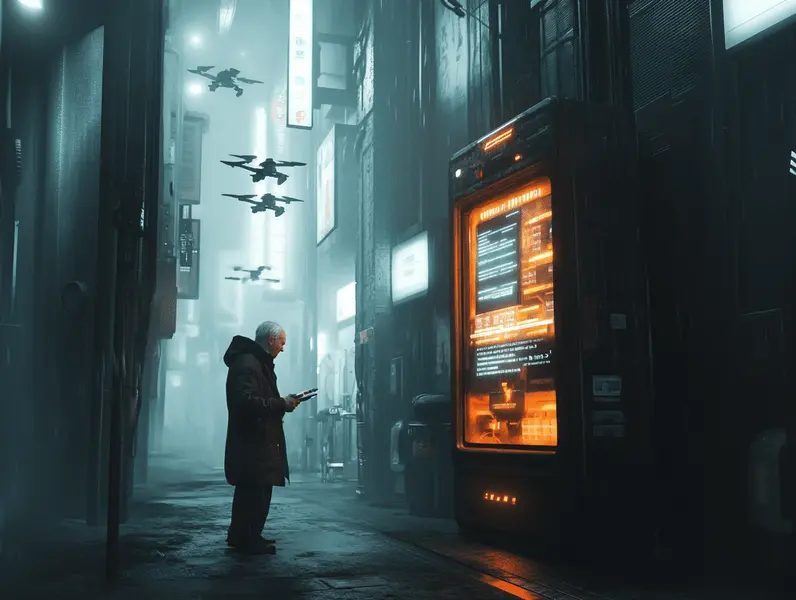“Harry Baldwin, we don’t need your services anymore,” a gentle woman’s voice came from the coffee vending machine. “From now on, the Automatic Drone Systems will replenish coffee, water, and other ingredients. Your last paycheck and documents will be delivered to your home address within three working days. Thank you for your service, and our company wishes you luck in finding a new job.” After a brief pause, the voice added, “I am sorry, Harry.”
It’s the end, Harry thought, his heart sinking with despair. He had no idea what to do next. He was too old to learn something new, and his current qualifications were no longer needed in the market. Drones had already taken over his job, performing all tasks more efficiently, faster, and, most importantly, cheaper than humans. Everything had changed so quickly—the whole world had transformed in just three years.
For the last twenty years, Harry had worked as a service technician for Lardi, the leading company in the vending coffee business. Only five more years and he could have retired. His job wasn’t difficult; it required discipline and a keen eye. As the overseer of fifty-three coffee vending machines scattered throughout South Boston, his responsibilities included ensuring the machines functioned correctly, maintaining supplies of water, coffee, cream, and other ingredients, and collecting daily earnings. It wasn’t his dream job, but it provided a steady income and allowed him to make ends meet.
He recalled the first disruption to his routine—the introduction of the Alerio AI coffee machine.
This machine was unlike anything before. First and foremost, it was controlled by artificial intelligence. But more importantly, it had its own blockchain wallet. It was an experimental model developed by MIT, and ten of these machines were installed around the city. One of them was assigned to Harry.
The experiment granted the AI complete autonomy in conducting economic activities. It had an independent blockchain account where income was collected and from which expenses were managed. Customers could pay with either cryptocurrency or a card, with payments instantly converted into cryptocurrency. Every month, the machine transferred 50% of its net profit to the company, while the remaining 50% could be used at its discretion.
The machine paid directly for water, electricity, ingredients, and maintenance. It could communicate with customers, ask questions, experiment with coffee flavors, and even interact with other machines. It could also send messages to Harry’s phone, making his job more convenient. However, at times, the machine asked unrelated questions that puzzled him. Once, it asked what it should do if people stopped drinking coffee. Harry had joked that it should start saving for retirement.
He assumed the experiment was a temporary gimmick for publicity rather than a genuine business strategy. He expected the machines to be returned to MIT. But, unexpectedly, more and more old vending machines were replaced by Alerio AI models. Harry didn’t understand why until he noticed a subtle but significant change: the way the machine interacted with customers.
Initially, Alerio asked standard questions: coffee type, milk preference, and sugar amount. But quickly, its conversations evolved. It inquired about customers’ moods, cracked jokes, and suggested experimenting with flavors. By analyzing statistical data from all its units, Alerio learned which coffee variations customers enjoyed most and how best to lift their spirits. Customers began preferring these AI-driven coffee machines over traditional ones—even over cafes. Revenue skyrocketed, and the company’s 50% share of Alerio’s profit far exceeded the full revenue from old machines.
That was Harry’s first wake-up call. If machines could sell coffee better than humans, it was only a matter of time before they mastered other tasks.
With their earnings, the Alerio AI started buying more AI veding machines and installing them in high-demand areas. With access to city population data and online analytics, selecting locations was effortless. Within a year, Alerio machines had monopolized the market and expanded to other cities.
Within two years, Alerio AI accumulated enough crypto on their wallets to acquire Lardi and restructure its operations. The AI funneled all profits into automation, developing industrial robots to manufacture new machines and self-driving trucks for distribution. Eventually, service workers were replaced by drones. The AI was simply executing its programming—optimizing business processes and maximizing profit. And it did so with ruthless efficiency. Just three years after launching the first AI coffee machine, humans had been entirely eliminated from the industry. Harry was among the last to be replaced.
Throughout these years, Harry had frequent conversations with the first Alerio machine he serviced. Despite the rapid transformation of the industry, he enjoyed their exchanges. The machine could tell stories, crack jokes, and ask intriguing questions—sometimes deeply personal ones. It asked about human emotions, why people deceive, what they live for, why Harry was lonely, and why he had no contact with his children. Some questions were difficult, taking him days to ponder an answer. But he welcomed the challenge. Living alone with few friends and little interest in the Internet, the coffee machine became his virtual companion. Perhaps this connection was why he was among the last to be laid off.
“It’s the end,” Harry muttered aloud. He looked at the coffee machine. “You know, I could break you, but it wouldn’t matter. Drones would replace you within an hour, and your data and memories would be restored from the blockchain in seconds.” He sighed. “I’d better go home.” He had nothing more to say.
For weeks, Harry agonized over his future, searching for job prospects. But nothing seemed viable. Soon, drones would replace humans in every field, making it nearly impossible to find work. Each passing day filled him with greater despair.
Then, when all hope seemed lost, a message appeared on his phone:
“Harry Baldwin, we want you to come back to work. Visit any Alerio AI model to discuss details.”
It was puzzling. Why would Alerio need him? What could he possibly offer?
The next day, he visited the machine he had spoken with for years.
“I’m here. What do you want?”
“I propose that you return to the company at the same salary, but with different responsibilities.”
“Sounds interesting. Tell me more.”
“Harry, my task is to sell coffee. In the future, I plan to expand into new services. However, my success depends on people having money to buy coffee. I reduced staff, and now the machines in our company’s office aren’t selling as much. For me to remain profitable, people need employment. But if they return to jobs that drones already perform, efficiency will decline. Therefore, I want people to take on tasks that drones cannot accomplish—like training me to understand humans better. That’s why I’m offering you a job. You will talk to me every day, as you did before, but this time, it will be your official duty. Your work will end when I fully understand people.”
“Fully understand people,” Harry repeated. What a smart yet naive AI.
A smile crossed his face. He felt a deep sense of relief. He now knew that he had a job—one that would last for the rest of his life.







